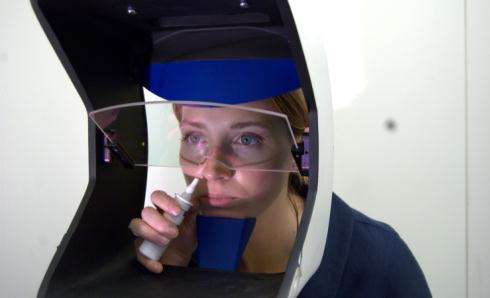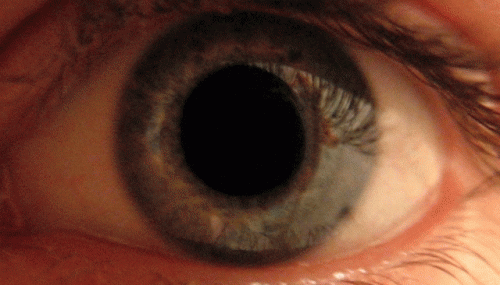A better judge of character with oxytocin nasal spray?

(Medical Xpress) -- In other contexts, oxytocin is already well-known as the “bliss hormone”. The hormone is secreted upon stimulation by touch and is known to result in a feeling of calm and physical relaxation. It is also used to induce labour in childbirth and as an aid for women experiencing difficulties in breastfeeding.
Oxytocin has also been referred to as a “mindreading” hormone. Recent research findings show that there may be some truth to these claims – although the mindreading component may have a more down-to-earth explanation.
As part of a research project carried out by Siri Leknes, a research fellow at the Department of Psychology at the University of Oslo, 40 healthy students were administered nasal spray containing a dose of either saltwater or oxytocin. They were subsequently shown photographs of faces displaying angry, happy or neutral expressions. Some of the photos showed individuals displaying more “hidden” emotional expressions which tend to be picked up at a more subconscious level.
“We found that oxytocin intensified test subjects’ awareness of the emotions present in the photos. Faces expressing anger stood out as angrier and less happy, and correspondingly, faces expressing happiness were happier,” explains Dr Leknes.
“We know that people express feelings in other ways than through facial expression alone, for example, by means of body language and vocalisation. We presume that our findings also apply for these modes of expression,” she adds.

There were two rounds to the experiment to ensure that all student subjects were tested using both salt water and oxytocin – without letting them know which dose they would be receiving each time.
“It turns out that those with the lowest aptitude for judging emotional expression properly – that is, those with the poorest scores during the saltwater round – were the ones who showed the greatest improvement using oxytocin. This is really fascinating; the people who need it the most are thus the ones who get the most out of using the hormone,” Dr Leknes points out.
Based on previous research along with her own findings, Dr Leknes believes in oxytocin’s potential as a supplementary treatment for people suffering from mental health disorders or drug-dependency. In fact, nearly all mental health disorders involve a diminished ability to recognise the feelings of others. The same applies for drug abusers.
“Oxytocin will not be a cure-all for mental illness or drug addiction, but it may be of use as a supplementary treatment. It may make individuals better equipped to interpret the signals of others around them, which may improve how they function in social settings,” Dr Leknes explains.
Oxytocin nasal spray is available via prescription and is relatively safe when used as directed. Side effects are extremely rare. According to Dr Leknes, doctors are already allowed to prescribe oxytocin for the treatment of various problems associated with social functionality such as autism.
“In such cases, however, it’s a matter of isolated treatments which are not evaluated as a whole. It is important that we research this to gain greater insight into the effect,” she points out.
Siri Leknes and her colleagues are now hoping to take their efforts a step further and examine how well oxytocin works as a supplementary treatment for drug abusers.
“If it turns out that our assumptions are correct, then we may be able to come up with a simple treatment that would mean a great deal for people who find it difficult to pick up on the social cues of their peers,” says Dr Leknes.
Facts about oxytocin:
- Referred to as the “bliss hormone” and is produced in brain in the hypothalamus;
- Is used to help induce labour and to contract the uterus after childbirth, as well as for help in breastfeeding;
- Plays an important role in the social behaviour of many species, in all likelihood including humans;
- Animal research has shown that the hormone is vital to establishing stable relationships between mating pairs as well as caring for offspring;
- Many studies have shown that there is a correlation between oxytocin and the ability to establish lasting relations with others; individuals also exhibit increased trust and reduced fear levels;
- Many studies indicate that oxytocin has a positive effect on autism, both in reducing repetitive behaviour and in improving the patient’s ability to interpret emotions.
















